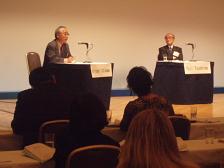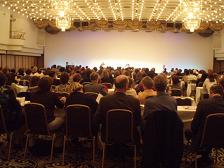米教員への経済講義: Economics Lecture to US Teachers [Report]
フルブライト・メモリアル基金のプログラム: FMF Program


政治を講義する市川博也教授・津島雄二議員と参加した米教員
Prof. Ichikawa and Mr. Tsushima Lecturing in Politics to Teachers
11月16日@京王プラザホテル: November 16 @Keio Plaza Hotel
経済についての講義要旨: Economics Lecture Summary
宮尾尊弘 国際大学教授: IUJ Professor Takahiro Miyao
「安倍政権の経済課題:イノベーションと再挑戦」
安倍政権の経済政策課題は、経済を再成長させるとともに個人には再挑戦させることで、そのためにイノベーションと教育・訓練が強調されている。問題はどうしたらイノベーションを活発化できるか、また教育や訓練で若者を再挑戦させることができるのかどうかということである。
以下の英文で詳しく論じるが、より基本的な問題は日本全体としても、若者としても、どうしたらよりよい生活のために積極的にリスクをとるようなチャレンジ精神を育成するかということである。このことがイノベーション、新産業創造、雇用創出、投資・消費促進をもたらし、ひいてはより高い成長にむすびつくであろう。
安倍首相がこの点に気づいて何か手を打つかどうかがポイントといえる。
"PM Abe's Economic Agenda: Innovation and Challenge"
Prime Minister Abe's Economic Policy Agenda may be summarized as "the economy grow again and individuals try again," that is, to achieve higher economic growth and to give a better chance for individual success, where innovation and education/training are emphasized for those purposes.
First of all, why economic growth? In reality, the Japanese economy is now growing again after the "lost decade" and a half (15 years) of stagnation. At the same time, higher growth is necessary for the sake of dealing with a number of serious economic problems such as (1) the government's huge budget deficit, (2) increasing social security burden and (3) future tax hikes in the aging, low-birthrate economy.
The question is how to achieve higher growth. Abe seems to be a supply-sider, emphasizing supply-side factors such as innovation, technology, investment, etc., but not mentioning any demand-side factor at all. A related question is how to accelerate innovation. It is well known that innovation is up to the private sector and is something the government cannot manipulate. Most likely Mr. Abe himself does not know how to do it and how to spur new venture-type business in Japan.
As for better chance for individual success, the issue is a widening gap between the rich and the poor in Japan. This is partly due to severe market competition on the global scale, but partly due to the lack of challenge spirit on the part of some young people: there are now so many NEET (people Not in Education, Employment or Training) and Freeters (living on short-term temporary jobs) in Japan.
Why is this a problem? The widening rich/poor gap might be used as a pretext for opposition to reform. Also an increasing number of non-working youth may well become an obstacle to growth due to the lack of skilled work force as well as the fiscal burden to provide social security to them, especially to those who might be called "elderly NEET." Here Mr. Abe's policy priority seems to be placed on the NEET/Freeter issue.
Then how to reduce NEET/Freeters? There is no easy solution, but the government will try to offer job counseling/training for them to find regular jobs, while business itself is to create more regular jobs and give on-the-job training to young people. And they themselves should learn more basic skills, especially math and science. But the question will remain as to whether young people would "try again" once they fail in education, employment or training.
In this connection, a more fundamental socio-economic issue is how to foster "challenge spirit," especially among young people to take risk for a better life in Japan. Such attitude will certainly affect the outcome of innovation and new business, and thus the speed of job creation. Willingness to take risk will lead to more investment and more consumption, contributing to higher growth. Hopefully, Prime Minister Abe can realize this and do something about it.




コメント 0